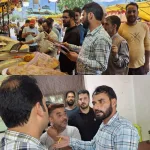Antimicrobial resistance (AMR) has emerged as a pressing global health challenge, exacerbated by unregulated use of antibiotics, self-medication, and insufficient public awareness. The theme for World Antimicrobial Resistance Awareness Week (WAAW) 2024 is “Educate, Advocate, Act Now”, serves as a clarion call to address this silent pandemic with urgency. For a region like Kashmir, where healthcare practices and cultural factors intersect, this theme resonates profoundly, highlighting the need to curb misuse of antibiotics through education, advocacy, and regulatory reforms.
Understanding Antimicrobial Resistance
AMR occurs when microorganisms such as bacteria, viruses, fungi, and parasites develop resistance to antimicrobial drugs, rendering them ineffective. As a result, common infections become harder to treat, increasing the risk of severe illness and death. The World Health Organization (WHO) has identified AMR as one of the top 10 global public health threats, with its impact exacerbated by factors such as over prescription, lack of awareness, and poor regulatory controls.
AMR in Kashmir: A Unique Context
Kashmir’s healthcare landscape presents unique challenges contributing to the rise of AMR:
- Self-Medication Practices: A significant number of people in Kashmir opt for self-medication, often purchasing antibiotics over the counter without a prescription. This practice stems from easy access to medications, cultural reliance on home remedies, and a lack of awareness about the dangers of unsupervised antibiotic use.
- Unregulated Antibiotic Prescriptions: Healthcare providers, particularly in private practices, frequently prescribe antibiotics unnecessarily or without proper diagnostic tests. This over prescription not only fuels resistance but also undermines the effectiveness of these critical drugs.
- Public Misconceptions and Expectations: Many patients in Kashmir perceive antibiotics as a panacea for all ailments, including viral infections like the common cold or flu. This expectation often pressures healthcare professionals to prescribe antibiotics even when they are not needed.
- Limited Diagnostic Facilities: In rural and remote areas, limited access to diagnostic tools results in empirical treatment with broad-spectrum antibiotics, further contributing to resistance.
- Environmental Factors: The improper disposal of pharmaceutical waste, including antibiotics, contaminates water bodies and soil, creating reservoirs for resistant microorganisms.
Educate: Raising Awareness
Education is the cornerstone of combating AMR. In Kashmir, targeted campaigns can bridge the knowledge gap among the public, healthcare professionals, and policymakers:
- Public Awareness Campaigns: Mass media, social media, and community programs can disseminate information about the risks of self-medication and the proper use of antibiotics. Local religious leaders, teachers, and community elders can play pivotal roles in spreading awareness, leveraging their influence to advocate for responsible antibiotic use.
- School-Based Programs: Integrating lessons on health literacy, including the dangers of AMR, into school curricula can instill responsible attitudes toward antibiotics from a young age.
- Healthcare Professional Training: Workshops and continued medical education programs can equip doctors, pharmacists, and nurses with the latest knowledge on antibiotic stewardship and resistance patterns, empowering them to make informed prescribing decisions.
Advocate: Strengthening Policies and Regulations
Advocacy efforts are critical to driving systemic change in how antibiotics are prescribed, dispensed, and monitored:
- Regulating Over-the-Counter Sales: Strict enforcement of laws prohibiting the sale of antibiotics without a valid prescription is essential. Regular inspections and penalties for non-compliance can deter pharmacies from engaging in this practice.
- Developing Stewardship Programs: Hospitals and clinics should adopt antimicrobial stewardship programs to guide the rational use of antibiotics. These programs can standardize treatment protocols, minimize unnecessary prescriptions, and monitor resistance trends.
- Promoting Evidence-Based Prescriptions: Policymakers should incentivize the use of diagnostic tests to confirm bacterial infections before initiating antibiotic therapy. Subsidizing these tests can make them accessible to underserved populations.
- Collaborating with International Initiatives: Aligning with global efforts such as the WHO’s Global Action Plan on AMR can provide Kashmir with the technical support and resources needed to combat resistance effectively.
Act Now: Implementing Practical Solutions
While education and advocacy lay the foundation, immediate actions are necessary to halt the spread of AMR in Kashmir:
- Setting up Regional Laboratories: Establishing well-equipped microbiology labs in all districts of Kashmir can facilitate early detection of resistant strains and guide appropriate treatment options.
- Improving Infection Control: Healthcare facilities must adopt stringent infection prevention and control measures, such as hand hygiene, sterilization protocols, and isolation wards for resistant infections.
- Strengthening Waste Management: Proper disposal of pharmaceutical waste through incineration and waste treatment facilities can prevent the environmental spread of resistant microorganisms.
- Engaging the Community: Community-based interventions, such as organizing workshops in villages and towns, can encourage grassroots participation in combating AMR. Empowering local self-help groups to monitor antibiotic misuse can foster accountability.
Role of Technology in Combating AMR
Technology can amplify efforts to curb AMR in Kashmir:
- Telemedicine Services: Expanding tele-consultation platforms can reduce the need for self-medication by connecting patients to qualified healthcare professionals.
- Digital Prescriptions: Implementing e-prescription systems can reduce fraudulent antibiotic prescriptions and provide a database for monitoring usage patterns.
- Mobile Apps for Awareness: Apps tailored to local languages and cultural contexts can educate users about the proper use of antibiotics and the dangers of resistance.
- Challenges Ahead
Despite these promising strategies, several challenges hinder progress in combating AMR in Kashmir:
- Limited Resources: Financial constraints and inadequate healthcare infrastructure make it difficult to implement large-scale interventions.
- Resistance to Change: Shifting ingrained practices, such as self-medication and empirical prescribing, requires persistent efforts and cultural sensitivity.
- Geopolitical Instability: Political and social unrest in the region can disrupt healthcare initiatives, delaying progress in addressing AMR.
A Wake-Up Call for Action
The theme of WAAW 2024, “Educate, Advocate, Act Now”, underscores the urgent need for a multi-pronged approach to combat AMR in Kashmir. Self-medication and unregulated antibiotic prescriptions are not just individual choices but public health threats with far-reaching consequences. By prioritizing education, advocating for robust policies, and implementing practical solutions, Kashmir can protect its people from the devastating impacts of AMR.
A Shared Responsibility
The fight against AMR requires collective action. Healthcare providers, pharmacists, policymakers, and citizens must unite to ensure that antibiotics remain effective for future generations. In the words of the WHO, “No action today means no cure tomorrow.” This WAAW, let us heed the wake-up call and commit to safeguarding our health through responsible antibiotic use and strengthened healthcare practices. Kashmir, with its unique challenges and opportunities, can become a model for regional efforts against AMR, paving the way for a healthier and more resilient future.
(The Author is a National and International expert on Healthcare quality, safety and accreditation, policy analyst and reforms. He can be reached at: [email protected])








